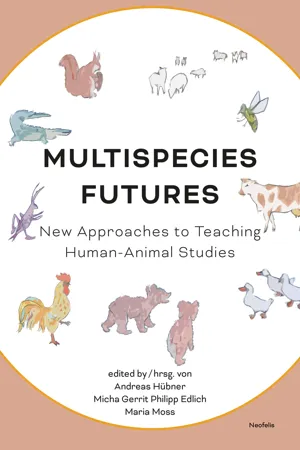
Multispecies Futures
New Approaches to Teaching Human-Animal Studies
- 236 Seiten
- German
- PDF
- Über iOS und Android verfügbar
Multispecies Futures
New Approaches to Teaching Human-Animal Studies
Über dieses Buch
In light of the dramatic growth and rapid institutionalization of human-animal studies in recent years, it is somewhat surprising that only a small number of publications have proposed practical and theoretical approaches to teaching in this inter- and transdisciplinary field. Featuring eleven original pedagogical interventions from the social sciences and the humanities as well as an epilogue from ecofeminist critic Greta Gaard, the present volume addresses this gap and responds to the demand by both educators and students for pedagogies appropriate for dealing with environmental crises.The theoretical and practical contributions collected here describe new ways of teaching human-animal studies in different educational settings and institutional contexts, suggesting how learners – equipped with key concepts such as agency or relationality – can develop empathy and ethical regard for the more-than-human world and especially nonhuman animals. As the contributors to this volume show, these cognitive and affective goals can be achieved in many curricula in secondary and tertiary education. By providing learners with the tools to challenge human exceptionalism in its various guises and related patterns of domination and exploitation in and outside the classroom, these interventions also contribute to a much-needed transformation not only of today's educational systems but of society as a whole.This volume is an invitation to beginners and experienced instructors alike, an invitation to (re)consider how we teach human-animal studies and how we could and should prepare learners for an uncertain future in, ideally, a more egalitarian and just multispecies world.With contributions by Roman Bartosch, Liza B. Bauer, Alexandra Böhm, Micha Gerrit Philipp Edlich, Greta Gaard, Björn Hayer, Andreas Hübner, Michaela Keck, Maria Moss, Jobst Paul, Mieke Roscher, Pamela Steen, and Nils Steffensen.
Häufig gestellte Fragen
- Elementar ist ideal für Lernende und Profis, die sich mit einer Vielzahl von Themen beschäftigen möchten. Erhalte Zugang zur Basic-Bibliothek mit über 800.000 vertrauenswürdigen Titeln und Bestsellern in den Bereichen Wirtschaft, persönliche Weiterentwicklung und Geisteswissenschaften. Enthält unbegrenzte Lesezeit und die Standardstimme für die Funktion „Vorlesen“.
- Pro: Perfekt für fortgeschrittene Lernende und Forscher, die einen vollständigen, uneingeschränkten Zugang benötigen. Schalte über 1,4 Millionen Bücher zu Hunderten von Themen frei, darunter akademische und hochspezialisierte Titel. Das Pro-Abo umfasst auch erweiterte Funktionen wie Premium-Vorlesen und den Recherche-Assistenten.
Bitte beachte, dass wir Geräte, auf denen die Betriebssysteme iOS 13 und Android 7 oder noch ältere Versionen ausgeführt werden, nicht unterstützen können. Mehr über die Verwendung der App erfahren.
Information
Inhaltsverzeichnis
- Cover
- Half Title
- Title Page
- Table of Contents
- Acknowledgements
- Hübner / Edlich / Moss: Introduction
- Roscher: Current Objectives of Human-Animal Studies
- Steffensen: Tiere im imperialen Diskurs
- Hübner: “Preventing Malicious and Wanton Cruelty to Animals”
- Bartosch: Dying to Learn
- Bauer: Reading to Stretch the Imagination
- Keck: Of Birds and Men
- Böhm: Teaching Empathy and Emotions
- Moss: “The skin and fur on your shoulders”
- Hayer: Jagd oder die Kultivierung der Gewalt
- Paul: The Philosophical Animal Deconstructed
- Steen: Spinnenbrille, Dog-Cam und Gassi mit Ziege
- Gaard: Epilogue
- List of Figures
- Colophon
- Backcover